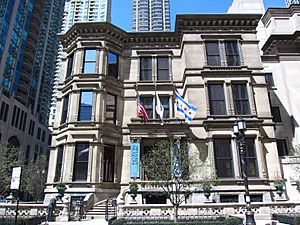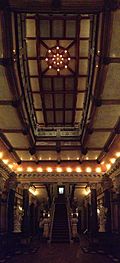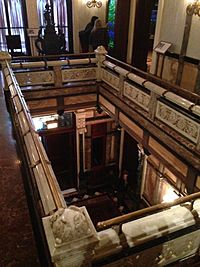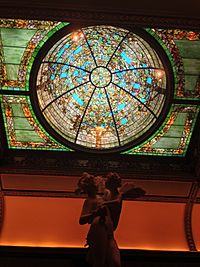Driehaus Museum facts for kids
 |
|
| Established | 2003 |
|---|---|
| Location | 50 East Erie Street Chicago, Illinois United States |
| Type | Decorative Arts Museum |
| Public transit access | CTA bus routes: Routes 3, 10, 26, 36, 125, 143, 146–148 and 151 Chicago 'L': Chicago Station Grand Station |
The Richard H. Driehaus Museum is a special place in Chicago, Illinois. It's located on the Near North Side, close to the famous Magnificent Mile. This museum is inside a beautiful old building called the Samuel M. Nickerson House. It was once the home of a rich banker named Samuel M. Nickerson, built way back in 1883.
Even though the house is old, the museum doesn't just show how the Nickerson family lived. Instead, it displays amazing art and designs from a time called the Gilded Age in America and the Art Nouveau period. These were times when people loved fancy and detailed decorations.
Inside, you'll see lots of marble, shiny onyx, and beautiful carved wood. There are also colorful tiles and stained glass windows. The museum shows some of the original furniture from the Nickerson family. It also has American and European art from the late 1800s and early 1900s. You can even see many pieces by a famous artist named Louis Comfort Tiffany. The museum is named after its founder, Richard H. Driehaus, who was a businessman and art collector from Chicago. All the art you see comes from his private collection.
Contents
History of the Museum Building
The grand mansion was designed for Samuel M. Nickerson by a well-known architect named Edward J. Burling. It took four years to build and cost a lot of money – about $450,000! When it was finished in 1883, it was said to be the most expensive and fancy private home in Chicago. Samuel Nickerson came from Brewster, Massachusetts. He also built a summer house there called Fieldstone Hall.
From Home to Museum
The Nickerson family lived in the mansion from 1883 until 1900. After them, a paper businessman named Lucius George Fisher bought the house. He lived there until he passed away in 1916.
In 1919, some important people in Chicago bought the house. They gave it as a gift to the American College of Surgeons. This group used the building for their offices until 1965. From 1965 to 2003, the College of Surgeons rented out the building to different people.
The building became a special historic place in 1976. It was officially named a Chicago landmark on September 28, 1977.
In 2003, Richard H. Driehaus bought the building. He decided to turn it into a museum. He had the building carefully restored to its original beauty. His goal was to save and share beautiful old architecture and design. The Driehaus Museum first opened its doors to the public in June 2008.
More recently, in 2022, the Driehaus Museum bought another historic building next door. This was the John B. Murphy Memorial Auditorium. On June 21, 2024, the museum opened its expanded campus, offering even more space for visitors.
What You Can See: The Collection
Inside the museum, you'll find many objects from the Driehaus Collection. These pieces are shown along with the preserved rooms and some of the original furniture.
Louis Comfort Tiffany Art
The Driehaus Collection has one of the largest collections of art by Louis Comfort Tiffany in the country. Richard H. Driehaus bought his first Tiffany piece, a stained-glass window, in 1978. Since then, his collection has grown to over 1,500 items! These include beautiful Favrile glass, vases, furniture, and many stained and leaded-glass windows.
Some of the most amazing Tiffany items you can always see at the museum include:
- Brightly colored, shiny stemware (drinking glasses).
- A large fire screen with shiny chain mail tiles.
- A unique lamp with a base made of eight large nautilus shells.
- A green glass humidor (a box for keeping things moist).
Furniture and Other Art
The museum also has a great collection of furniture. You can see a set of carved maple chairs by George A. Schastey & Co. They were one of the original companies that decorated the Nickerson House. There's also a rare grand piano from Chickering and Sons and a large dining table from the Nickerson era by Herter Brothers.
Other cool things to spot include:
- A brass chandelier with boar heads and hunting horns.
- Vases by Émile Gallé and Sèvres.
- A fancy gold clock by Deniére.
- Paintings by artists from the Pre-Raphaelite Brotherhood.
- A dramatic marble sculpture by Oscar Spalmach showing the mythical figures of Cupid and Psyche.
The second floor of the museum used to be where the Nickerson family lived. Today, it's used for special art exhibitions. The third floor has a ballroom where many of the museum's events happen. There's also a lounge where visitors can relax on Art Nouveau furniture by Edward Colonna.
Programs and Tours
The museum offers guided tours every day. You can also just buy a ticket for general admission and explore on your own.
Special Themed Tours
Sometimes, the museum offers special tours based on different themes:
- Servants’ Tour: This tour is like a living history lesson. A guide dressed as a fictional housekeeper shows you the servants' areas of the mansion.
- McCormickville Walking Tour: This tour takes you outside to explore the historic neighborhood around the museum.
- Twilight Tour: An evening tour that talks about how the Nickersons and other wealthy Chicago families socialized and spent their evenings long ago.
Events and Learning
The Driehaus Museum also hosts many public events. These include concerts, talks, and family programs. They all help to teach people about saving old buildings, decorative arts, and the Gilded Age culture. For example, they have a jazz concert every three months with musicians from the Chicago Jazz Orchestra. They also have the Samuel M. Nickerson Lecture Series, where experts talk about design and art from the late 1800s and early 1900s.
Past Exhibit: Stained Glass Gallery
The museum used to have a special gallery for stained glass at the Navy Pier. This gallery showed eleven beautiful Tiffany stained glass windows. These windows featured church scenes, landscapes, and people. There was also a large stained glass fire screen. This gallery closed in 2017.
Images for kids
 | Janet Taylor Pickett |
 | Synthia Saint James |
 | Howardena Pindell |
 | Faith Ringgold |
















